Recent General Posts
What the Polar Vortex Means for Your Pipes
1/15/2024 (Permalink)
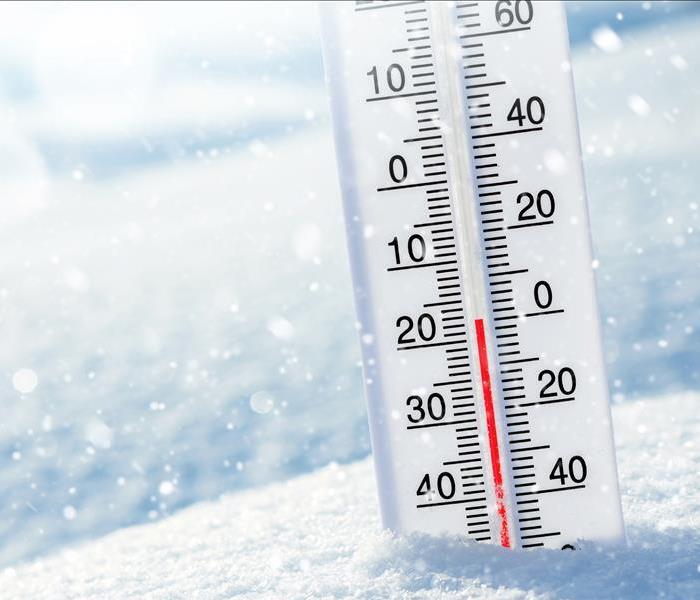 Polar Vortexes bring exceedingly cold temperatures
Polar Vortexes bring exceedingly cold temperatures
As the winter weather continues, "Polar Vortexes" become far more likely, signaling plummeting temperatures and severe weather conditions. This meteorological term, often associated with bone-chilling cold, can have a profound impact on daily life, particularly for homeowners and business owners. In addition to several drops in temperature to worry about, polar vortexes also heavily affect plumbing systems. As temperatures dive, the risk of pipes freezing and subsequently bursting increases, potentially leading to severely damaging water floods. Understanding the polar vortex, how it affects plumbing piping, and the necessary preventive measures are essential for bracing for the winter months. SERVPRO of East Boston, Chelsea, and Revere has crafted some preventive measures you can utilize to ensure your plumbing stays safe during the ongoing polar vortex.
Understanding the Polar Vortex and Its Impact
A polar vortex is essentially a vast expanse of swirling cold air that typically envelopes the polar regions. However, during the winter, the vortex at the North Pole often expands, pushing frigid air toward the equator and affecting much of the Northern Hemisphere. This shift can result in a sudden and steep drop in temperatures, often catching businesses and residences off-guard.
The critical issue with these plummeting temperatures is their effect on water pipes. Water expands when it freezes, and this expansion can exert extraordinary pressure on pipes, regardless of whether they are made of metal or plastic. When the pressure becomes too great, pipes can burst, leading to water damage, the potential for mold growth, and the need for repairs on top of restoration and cleaning services.
Prevention and Protection
To mitigate the risks of a polar vortex freezing your pipes, consider the following preventive steps:
- Insulate Pipes: Wrapping exposed pipes in foam insulation, particularly those in unheated areas like basements, attics, and garages, can significantly reduce the risk of freezing.
- Maintain Consistent Indoor Temperature: Keeping your home heated consistently, even when you're away, helps keep the internal temperature of pipes above freezing.
- Allow Faucets to Drip: Allowing a slight drip in faucets can prevent pressure buildup within pipes, reducing the risk of freezing and bursting.
- Drain Water from Pools and Sprinklers: Drain water from the swimming pool and sprinkler supply lines following the manufacturer's instructions.
- Close Inside Valves Supplying Outdoor Hose Bibs: After removing and draining outdoor hoses, close the inside valves that supply these bibs but leave the outside valve open.
- Insulate Vulnerable Spaces: Increase insulation in areas like attics, basements, and crawl spaces to maintain higher temperatures.
- Open Cabinet Doors: Allow warmer air to circulate around plumbing by opening kitchen and bathroom cabinet doors.
The polar vortex, while a natural weather phenomenon, poses a significant challenge to plumbing, particularly regarding the risk of frozen and bursting pipes. By understanding this meteorological event and taking proactive, preventative measures, you can safeguard your home against the potentially devastating and costly consequences. Prevention actions are far more effective and less costly than repair. Stay warm, stay informed, and prepare your home for whatever the winter brings.
Should you incur any water or storm damage during the Polar Vortex, feel free to contact SERVPRO of East Boston, Chelsea, and Revere, and we'll make it "Like It Never Even Happened!"
I am glad I did not have insurance for ....Said no one ever....
12/5/2016 (Permalink)
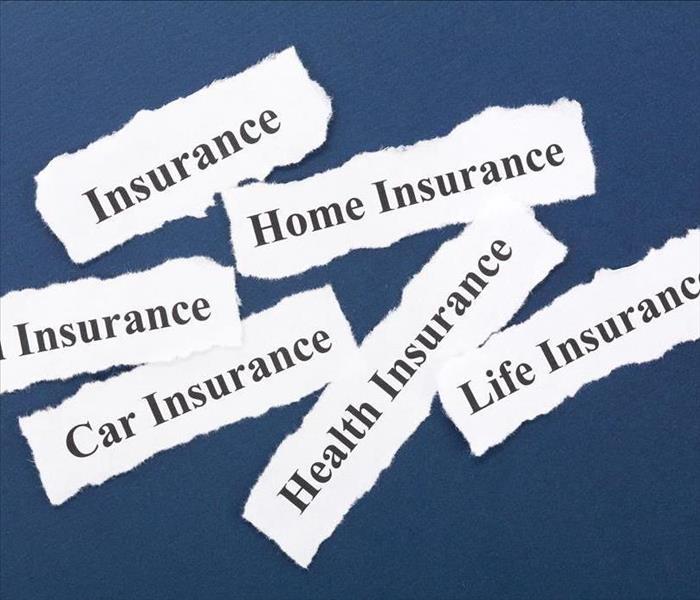 Having the right insurance and coverage can mean all the difference in the world
Having the right insurance and coverage can mean all the difference in the world
Never has anyone said I wish I did not have that health insurance after having a severe health scare.
Never has anyone said wow I sure am glad I did not have car insurance after getting into a bad car accident where there was personal property damage and an injury to themselves or others.
Never has anyone said wow that insurance was a waste of money after suffering devastation from a fire.
Never has a loved one said I am grateful that I got to pay for those funeral services myself, due to a family member not having death benefits laid out prior to something happening.
Never has anyone said it is a good thing I did not spend $30 a month on rental insurance when the lost everything in their apartment due to a frozen pipe break or fire in the home they were renting from
Sure everyone complains about insurance, and yes many many times it is an expense we all look at as wasteful and a crock especially if you have never had to use it on a larger scale. But let us examine some situations where this was not the case. These examples are real , we know these people personally and they have all occurred in the month of November of this year.
- Health Insurance
- This is a very large expense for most and with premiums, deductibles and co-pays going up can be something we look at to cut from our expenses. This is always a bad idea, all it takes is one accident, one injury and everything you have could be gone. Do you have enough money in your savings to be out of work with no income for 2 years or more? If you are like most Americans your answer is no. Well guess what then you cannot afford to not have health insurance.
- Health Insurance & Aflac coverage Example: Recently read a story about a gentleman that has cirrhosis of the liver. While undergoing testing for this they found prostate cancer. Both of which are painful and require aggressive treatment with inpatient and outpatient care for more than 3 months already. His wife was walking into the hospital during one of his admission days and she slipped and fell in the parking lot and broke her back. This is going to require surgery. Two people who can no longer work, which do not have a means of paying their regular bills nor the mounting hospital bills due to having no insurance.
- Obtaining insurance for your bills like Aflac and any sort of health insurance will provide a buffer for such care and would put them in a much better position to focus on their care and getting better rather than where they will live when they are released from the hospital.
- Home Owners Insurance with Fire Coverage Rental insurance & Health Insurance Example
- A family was trying to clean up a home they had rented which was trashed by the occupants. The owners had recently moved to Colorado and rented out a place in Florida. A faulty electrical wire sparked a major fire one night while the owner was trying to clean up the trashed Florida home. He suffered severe burns to a good percentage of his body specifically his hands and the home was burned to the ground. He has only been treated in the hospital for 2 weeks with weeks and weeks to go, as burns require constant care for high risk of infection. Medical bills alone are over $20K after 2 weeks. There was no insurance on the home in Florida and now they have nothing left what so ever. There is also no medical insurance so he checked himself out of the hospital and is trying to treat the painful burns on his own due to the expense of the proper care in the hospital.
- Rental Insurance:
- So you do not own a home. Does that mean you do not need to protect the things you do own? The items in your apartment are not covered by the home owners’ policy. If there is water damage from a broken pipe or fire and smoke damage that puts you out on the streets with nothing left can you start over easily? The answer is most likely no. Making sure you are able to replace items that you lost is very important this insurance is very cost effective and less than a dinner out once a month.
- Rental insurance example:
- A young couple with 2 children living in a 3 family home in the area. The home suffered a fire. Many of their belongings were lost in the fire. They were able to get in and look around but where told not to remove anything as they investigators were not done. Once the building was cleared for them to remove the few things that remained it was noticed they had been robbed. Not only do they have to come up with first, last and security deposit to find a new place to live. They must replace all items that were lost in the fire or stolen. Would you be able to recover and replace these items in less than a 2 week time frame. Why two weeks???? That is all that many assistance agencies will provide for shelter in regards to shelter and food.
- Death/ Funeral expenses & Health Insurance:
- Death benefits & Health Insurance Example:
- Many times death is not planned for and can be sudden or tied to an onset of an illness. Should a loved one die do you have $ 10K or more for their services. What will you have to sacrifice to give them the send off they deserve.
- Unexpected Death Example:
- A 38 year old father of 2 went to sleep and never woke up. He had a blood clot let go and went into his heart from his lungs. His family had to raise funds to be able to provide him with funeral services. This delayed the services by a few weeks. When dealing with a loved ones’ death trying to raise enough money for a proper burial is not what you want to deal with.
Will you have to choose between your health and a bill? Where is your line of care drawn and what will you be able to rebuild with when there is nothing left. These stories are not meant to have you roll your eyes and say it will not happen to me.
These are all real world examples of people we know just during the month of November. These personal accounts are near and dear to use as they are friends or family of friends. Insurance is the one items you spend money on that you want to be a waste of money but let me be the first to tell you it only takes one accident, on slip and fall, one bad day to make it the most valuable thing you have ever purchased.
If you are not sure what insurance is right for your specific situation or what you may need reach out to your local insurance agent. With everything being so customizable it is very easy to find what fits your needs. Please do your research, a lot of it is not as expensive as you may think and the peace of mind for you and your family can not have a price. Be safe out there we want you home with your family every day.
Insurance do you have the right insurance and it is enough?
11/10/2016 (Permalink)
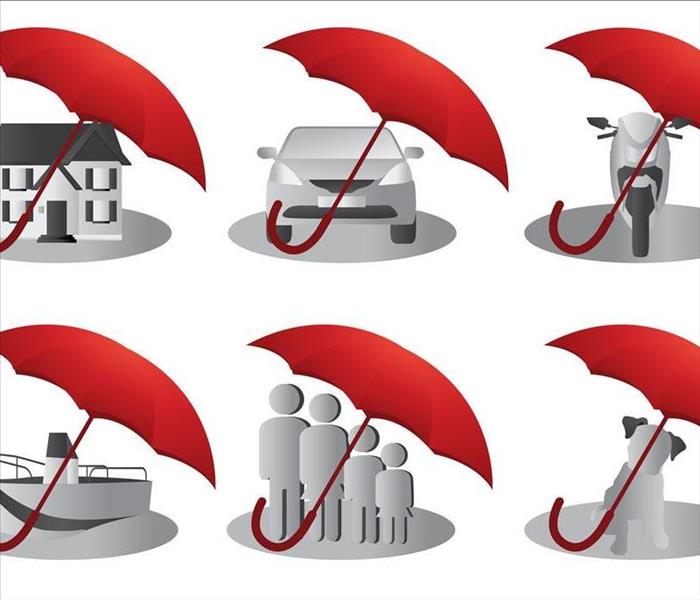 Do not get caught in the rain with out the right coverage will your business survive?
Do not get caught in the rain with out the right coverage will your business survive?
Insurance
We need to take time out from our normal blogs to talk about small businesses and the insurance coverage that many have and what is missing. When businesses call us it is usually because of an emergency situation. Of all the calls we get 50% of businesses will not reopen. Of the ones that do reopen most of them had an emergency plan in place as to how they will respond to the disaster and who to call. These disasters are costly in so many ways, another reason for an inability to reopen is the lack of the proper insurance that will cover all aspects of the business. Business insurance is not just one form of insurance it is an overall assessment of the type of business you do and what risks are involved with that and that area in which you work.
Let us dive into this a little bit more. What is a business, it is your livelihood, the way you provide for your family and its needs. The home that you live in, the food you eat, and the fun things you do together. Beyond just a business, it is your way to make your community better through job creation, solving a need within the area for your products and services. As well as a way of giving back to those less fortunate. Making sure all of these things are protected is important and while many of us look at insurance as scam or a requirement that is never used, talk to someone that has had a major life event and you will see it more than pays for itself with even just one problem.
Most business owners will obtain the lowest amounts of insurance coverage with a high deductable. This is due to the vast scope of the requirements. The main types of insurance required are general liability, Automobile, workers compensation, professional liability, Directors and officers insurance, data breach, home owners, renters, and life insurance. This sounds pretty inclusive right, very very wrong there are a few important insurance policies missing. Crime or Fidelity Insurance and business interruption insurance are very important.
What happens if there is a riot in the area and your business is looted and burned to the ground? Too extreme ok what if your business is robbed? These are crimes and without crime insurance could be your responsibility fully. How much money was taken, how much damage to the property did they cause, were your employees present and what lasting effects will they have from such a traumatic event? Still to unlikely for your business…Ok what about if some kids on a dare break in and graffiti the inside of your facility and leave a mess for you to comb through. Crime or fidelity insurance will protect you from this sort of damage. Of course no one thinks this will happen to them but if it does and a lot of damage is done it can put you quickly out of business.
Business interruption insurance. What is that you ask? Taking more of a look at what we said earlier about your business it is the way you make money. That can only be done when you are open for clients to come and partake in your services or buy your products. Many times a major event such as damage from storm or pipe burst can take more than 30-90 days for you to get back to normal. Do you have enough in reserves for your overhead to be covered for an extended period of time.
Should a major event cause you to close how does your money continue to be generated? How do your employees continue to be paid? Who is going to pay your bills?? If your employees will not be working for an extended period of time and they are a great staff will you lose them? They have bills to still pay and may not be able to afford to wait around for things to settle down. Business interruption insurance allocates for all of these things.
Businesses Owners Policy packages tend to have bundled insurance for all of your needs and can be customized based on the type of business you have. Bundles tend to save you money and allow for the fullest scope of coverage needed. Speak to your insurance broker today if you are not sure about the adequacy of the coverage you currently have. Being prepared is more than just having a plan, and knowing what to do. It is having everything in place and having the proper coverage before you need it.
National Prepardness Month
9/1/2016 (Permalink)
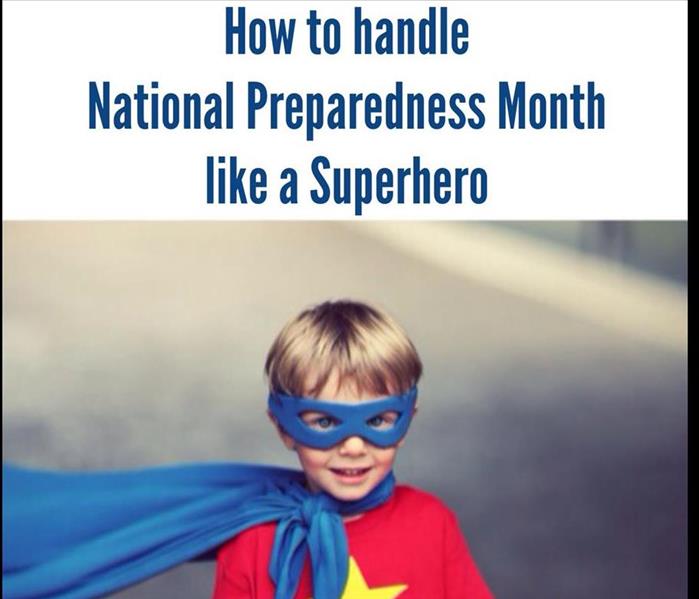 Be a leader and superhero to your community, Prepare for anything .. and share your ideas with others
Be a leader and superhero to your community, Prepare for anything .. and share your ideas with others
Extreme weather seems to be all around us and daily we turn on the news and there is another story of disaster striking. Tornados in the middle of the country, flooding in the south, drought in the western part of the state and the extremes seems to be becoming more frequent and more predominant than ever.
Did you know there is a website called Weather Ready Nation where you can find all sorts of information on global weather, how to be prepared and prevent problems during extreme weather. http://www.nws.noaa.gov/com/weatherreadynation/
Below you can find a list of some basic information that you can use to get you started.
What can you do to prepare for a disaster and where can you find the information for your area.
What can you do?
First and most important thing to know is what every emergency is different having a plan of action for how to respond is pivotal in recovery. Some of these emergencies can take place and cause days, weeks or months of recovery time. Understanding the area that you live in and its susceptibility to specific types of disasters can go a long ways. For example when you live in the middle of the united states it is important to know about tornados, when the season is at its peak and know how to stay safe during an actual tornado. Floridians especially need to know how to remain safe during a hurricane. That is not to say that these events do not happen outside of these areas but they are more prone to them than other areas of the country.
What do you need
It is also very wise to stock pile specific items that, many times can be overlooked in an emergency. Having an up to date emergency supply kit, an emergency family plan and access to news and weather updates will be key to easing the process.
Your emergency supply kit should contain some key essentials. Such as 3 days of food and water per person. The amount of water that you should have on hand should be one gallon per person per day for those 3 days. Radios and flashlights should always be battery operated and extra batteries should be included within the supply kit. A fully stocked first aid kit with no expired medicines should also be on hand, if you take your own personal medications it is always advisable to set 3 days worth aside within this kit to ensure you have what you need. ( Remember to rotate out the medicines over time to make sure nothing is expired). Wet naps, dust masks, plastic bags and plastic wrap with tape can help keep things sanitary and help prevent illness from contamination. Some tools are essential have either pliers or a wrench to turn off water valves or other utilities, manual can openers and maps will also be useful to have on hand. Cell phone are pivotal but maintaining a charge for days on end can be a challenge look into solar options for your type of phone. There are other essentials if you have pets it is important to take their needs into account when you are getting your emergency kit ready Please visit www.ready.gove/kit for more ideas
A Plan
You also need a plan to make sure that everyone will be able find each other should you all be away from the home at the time an issue arises. Having a central meeting point, and a means of free flowing communication to verify that everyone is safe will remove a great deal of stress from an already stressful situation. Talking about it is not enough though make sure it is written down and everyone has a copy they are able to keep with them.
Share your plan..
We all talk and communicate with others daily via various forms of social media and technology. Sharing with them your plan could encourage them to get one together for their family and just might make the difference. Show them images of your kits, where you found your information and what you are doing to try and make sure your ready.
What to do before help arrives!!!!!
7/19/2016 (Permalink)
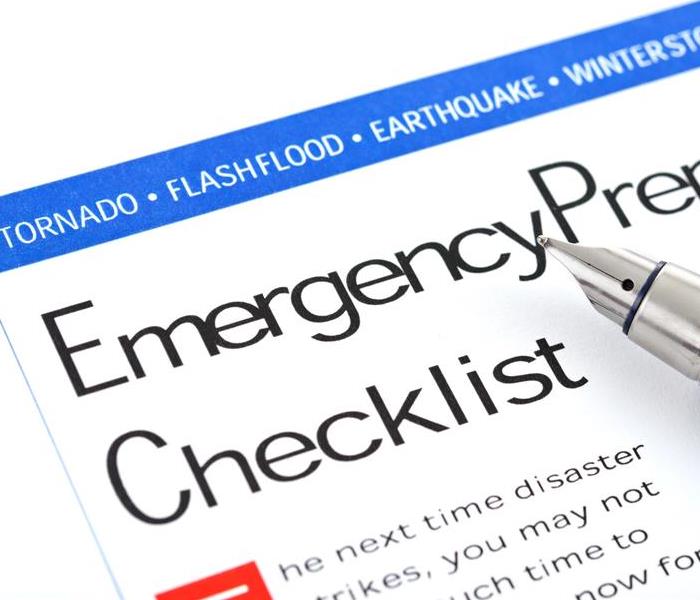 What to do until help arrives after an emergency strikes your home
What to do until help arrives after an emergency strikes your home
FIRE AND SMOKE DAMAGE:
Do:
Limit movement in the home to prevent soot particles from being embedded into upholstery and carpet.
Keep hands clean. Soot on hands can further soil upholstery, walls and woodwork.
Place dry, colorfast towels or old linens on rugs, upholstery and carpet traffic areas.
If electricity is off, empty freezer and refrigerator completely and prop doors open to help prevent odor.
Wipe soot from chrome on kitchen and bathroom faucets, trim and appliances, then protect these surfaces with a light coating of lubricant.
If heat is off during winter, pour RV antifreeze in sinks, toilet bowls, holding tanks and tubs to avoid freezing pipes and fixtures.
Wash both sides of leaves on house plants.
Change HVAC filter, but leave system off until a trained professional can check the system.
Tape double layers of cheesecloth over air registers to stop particles of soot from getting in or out of the HVAC system.
DON’T:
Attempt to wash any walls or painted surfaces without first contacting a professional.
Attempt to shampoo carpet or upholstered furniture without first consulting a professional.
Attempt to clean any electrical appliances (TVsets, radios, etc.) that may have been close to fire, heat or water without first consulting an authorized repair service.
Consume any food or beverages that may have been stored close to fire, heat or water. (They may be contaminated.)
Turn on ceiling fixtures if ceiling is wet. Wiring may be wet or damaged and cause electrical shock, and air movement may create secondary damage.
Send garments to the dry cleaner. Improper cleaning may set in smoke odor.
Water damage from clean water
Do:
Shut off the source of water if possible or contact a qualified party to stop the water source.
Turn off circuit breakers for wet areas of the building, when access to the power distribution panel is safe from electrical shock.
Remove as much excess water as possible by mopping and blotting.
Wipe excess water from wood furniture after removing lamps and tabletop items.
Remove and prop up wet upholstery cushions for even drying.
Place aluminum foil or wood blocks between furniture legs and wet carpeting.
Remove to a safe, dry place any paintings, art objects, computers, documents and other materials that are valuable or sensitive to moisture.
Use wooden clothespins to keep furniture skirting off damp floors.
Hang draperies with coated hangers to avoid contact with wet carpeting or floors.
Hang furs and leather goods to dry separately at room temperature.
DON’T:
Enter rooms with standing water where electrical shock hazards may exist.
Enter affected areas if electrical outlets, switches, circuit breakers or electrical equipment are exposed to water. Always avoid electrical shock hazards.
Leave books, newspapers, magazines or other colored items on wet carpets or floors to cause staining.
Leave Oriental rugs or other colored rugs on wet wall-to-wall carpets to cause staining.
Use your household vacuum cleaner to remove water, possibly causing electrical shock or damage to the vacuum cleaner.
Use TVs or other appliances while standing on wet carpets or floors, especially not on wet concrete floors.
Turn on ceiling fixtures if ceiling is wet or enter rooms where ceilings are sagging from retained water.
Water damage from contaminated water
DO:
Avoid all contact with sewage and items contaminated by sewage.
Wash your hands thoroughly after contact with contaminated items.
DON’T:
Spread contaminated water by walking unnecessarily on damaged or wet areas.
Turn on the HVAC system if there is a possibility of spreading contaminated air.
Use household fans to dry the structure and spread contaminants.
Use products for personal hygiene and cleanliness if exposed to the contaminated areas.
Note: If exposed to harmful waste, OSHA recommends a post-exposure medical evaluation.
Consult your local health department or physician.
Vandalism Damage
DO:
Hose or wash egg damage from building exterior as soon as possible.
Vacuum glass particles from carpets and upholstery.
Save containers which reveal the ingredients of spilled inks, cosmetics and paints.
DON’T:
Attempt to remove ink, paint or cosmetic stains.
Operate damaged lamps or appliances.
Discard furniture wood chips, broken pieces from porcelain, furniture or art objects.
HARMFUL WASTE
DO:
Stay out of affected areas.
Call emergency service personnel if the situation is life-threatening.
Treat all bodily fluids as if they are contaminated.
DON’T:
Attempt cleanup of any kind.
Touch or handle items that might be contaminated with bodily fluids.
The RIGHT EXPECTATIONS!!!!
2/23/2016 (Permalink)
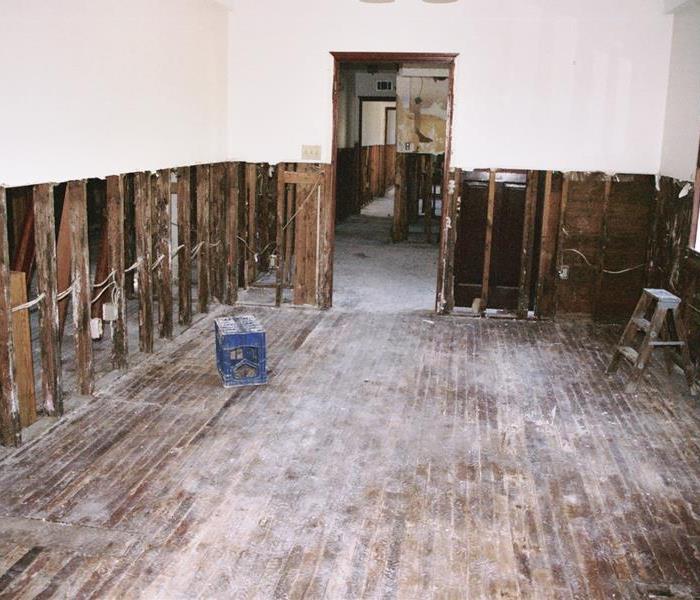 Water damage with cut due to water absorbing up into the wall. Cut made to prevent mold
Water damage with cut due to water absorbing up into the wall. Cut made to prevent mold
You have a water emergency...what to expect
We know your most valuable investment has been damaged along with many of your personal items. The loss and confusion you feel is high. It is understandable that you are upset and want it to be fixed as soon as possible. You call a 24/7 emergency service provider to come out and work towards getting you back to normal.
You expec t that they will be there from the moment you call to the moment you are back to normal. Yet they come in suck up all the water and leave. What in the world….. Why are they not pulling down your walls ripping up your floors and getting to work? Well let us examine that
Have you called your insurance company and received a claim number yet?
No well with no claim number there is no way to know if your damage was a coverable expense thus drastically changing the scope of the work. Should it not be covered all financial obligations will fall on you
Did they leave fans and what appears to be other drying equipment?
Yes. Well then they are trying to mitigate your losses and see how much can be salvaged through the drying process before just ripping it all out. The main reason for this is that many insurance companies require and attempt at salvaging as much as possible instead of resorting to just ripping it all out.
You have not seen anyone WORKING WORKING for 3-4 days in your home and are feeling forgotten!!!!
Guess what water takes a very specific amount of time to be extracted from walls, floors, and the air. That equipment that was left must remain on, and running for a certain amount of time and depending on the amount of water that you incurred this can be more than a full week.
AND NO Putting in more equipment will not help and speed up the process. It can make it worse so please be patient.
I turned off the equipment to sleep or have a dinner party as it was really loud. What is the big deal?
You wanted to sleep better and now do not understand how to turn the equipment back on to the proper settings. This is why many companies have you sign paperwork stating you will not turn off the equipment. It has to run for a certain amount of time shutting off the machines adds 8+ hours which is another whole day or more depending on how long it was off for. It also requires an equipment tech to come back out and reset all your machines increasing cost
My home was pretty hot and humid so I opened all the windows and doors to help circulate the air. Why is the technician telling me it will take more time now?
Guess what science majors cold air does not hold the moisture in the air the same way as warm air. The machines are made to pull the water out of the walls, floors and ceiling into the air and the machines scrub the air and put dry air back in. Opening the door changes the relative humidity in the home thus delaying the process despite what you think about it helping circulate. It prolongs the process
Why did the crew leave after only doing the demolition on part of the home?
The first is that getting things open to let the air moves try and dry out the walls and let them dry out.
The other reason is less understood but other clients now have the same issue you initially had with standing water and an immediate need to start the process. The EMERGENCY portion of your problem is over theirs is just beginning. It must be understood that the standing water and the flowing water is the priority and carries the highest health risks and must be addressed first. Demolition, drying and rebuild all take a back seat to the emergency part of the problem.
Water, Fire and mold remediation companies do have very specific training with all of this and while they are very busy in the northeast right now and may not relay all of this information to you please know they are not ignoring your problem nor are they trying to put you off. But you need to know that there is a process, and not every aspect has to be addressed all at once and many of it cannot be.
If you have questions please ask but also make sure you have reasonable and realistic expectations of the process. Many of the demolition teams are working 16+ hour days to get everyone back to normal.
CARBON MONOXIDE?? KEEPING IT OUT OF YOUR HOME
2/9/2016 (Permalink)
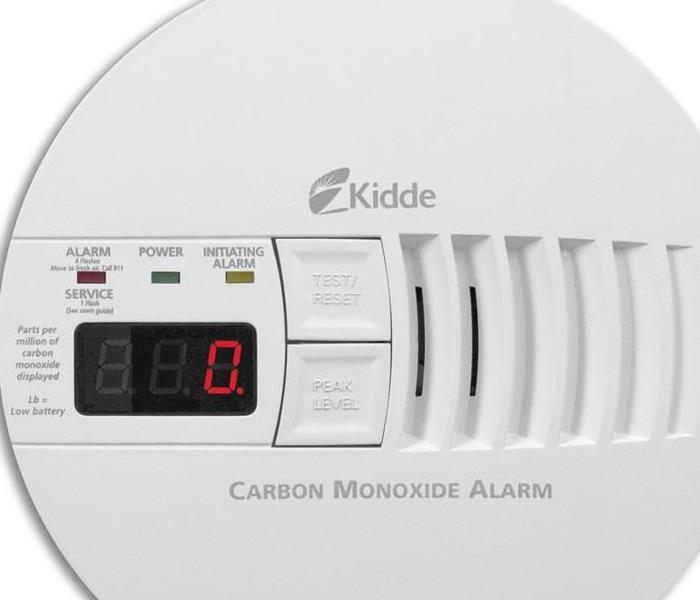 Carbon Monoxide keeping it out of your home
Carbon Monoxide keeping it out of your home
Carbon monoxide is a colorless, odorless, and tasteless gas that is less dense than air. In concentrations over 35 parts per million it is toxic. It is formed when there is not enough oxygen in the blood to convert the oxidization of compounds containing carbon.
It is used in the chemical industry for a variety of things some of which the processing of things like coal into diesel fuel itiis also used to make Acetic acid which is the main component of Vinegar, You have got that right it helps us make vinegar. Which is used for hundreds of things. So why does everyone make suck a big deal about it then?
It is found naturally within the environment and even used on purpose to keep things such as beef, pork, and fish looking more fresh as we stated earlier it does interact with the blood keeping it more cherry red and the appearance of freshness.
The amounts found naturally are not enough to really hurt you normally but the overall places it can be found in your home is another story.
Carbon monoxide inhibits the delivery of oxygen to the body and its tissues. Due to the fact that it is odorless, colorless, and tasteless makes it so dangerous. Making sure you have a battery backed up carbon monoxide detector in multiple rooms and levels of your home will ensure the best possible results.
Carbon Monoxide symptoms included but are not limited to fatigue, headache, nausea, vomiting, dizziness and overall weakness. Infants can seem overly irritable and feed poorly. There can be neurological symptoms such as confusion disorientation fainting and even seizures. Not all of these symptoms may be present nor does it mean that if you have these symptoms you have carbon monoxide poisoning but they are good things to keep in mind and be aware of.
In the United States an average of more than 500 people die every year and thousands are hospitalized. How does this happen? The main reason is we live indoors and utilize equipment within our homes that produce this toxic gas if it is not working properly. The right ventilation and some common sense are all extremely important in preventing problems from carbon monoxide.
Any equipment that burns fuel such as furnaces, water heaters, room heaters, stoves, portable generators, fireplaces, and even garages where there is not enough ventilation and a car that is left running or a small leak in the exhaust system can produce carbon monoxide and circulate it into the car or home. Below you will find a list from the center for disease control that will help prevent carbon monoxide within your home.
Install a battery-operated or battery back-up CO detector in your home and check or replace the battery when you change the time on your clocks each spring and fall. Place your detector where it will wake you up if it alarms, such as outside your bedroom. Consider buying a detector with a digital readout. This detector can tell you the highest level of CO concentration in your home in addition to alarming. Replace your CO detector every five years.
Have your heating system, water heater, and any other gas, oil, or coal burning appliances serviced by a qualified technician every year.
Do not use portable flameless chemical heaters indoors.
If you smell an odor from your gas refrigerator have an expert service it. An odor from your gas refrigerator can mean it could be leaking CO.
When you buy gas equipment, buy only equipment carrying the seal of a national testing agency, such as Underwriters’ Laboratories.
Make sure your gas appliances are vented properly. Horizontal vent pipes for appliances, such as a water heater, should go up slightly as they go toward outdoors, as shown below. This prevents CO from leaking if the joints or pipes aren’t fitted tightly.
Have your chimney checked or cleaned every year. Chimneys can be blocked by debris. This can cause CO to build up inside your home or cabin.
Never patch a vent pipe with tape, gum, or something else. This kind of patch can make CO build up in your home, cabin, or camper.
Never use a gas range or oven for heating. Using a gas range or oven for heating can cause a build up of CO inside your home, cabin, or camper.
Never burn charcoal indoors. Burning charcoal - red, gray, black, or white - gives off CO.
Never use a portable gas camp stove indoors. Using a gas camp stove indoors can cause CO to build up inside your home, cabin, or camper.
Never use a generator inside your home, basement, or garage or less than 20 feet from any window, door, or vent.
We want you to be safe and enjoy every bit of modern life but make sure you are doing so safely. If you have any questions please let us know and we will work with you to get your home as safe as possible. Remember when you do have an issue SERVPRO of East Boston Charlestown and Chelsea and Revere will make it like it never even happened.
Prepare for winter..We have you covered
12/31/2015 (Permalink)
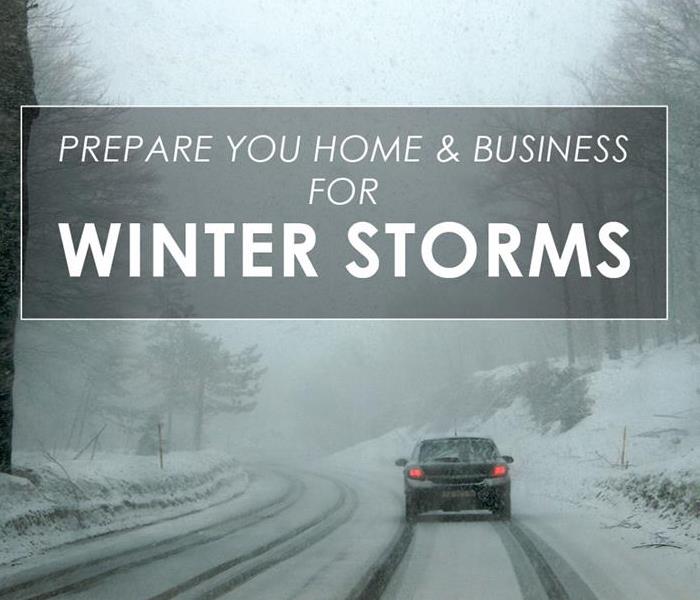 Preparing your home and business for winter...
Preparing your home and business for winter...
Tips for Preparing Your Home & Business for Winter Weather
Home
1) Keep cabinet doors open during cold spells. This allows warm air to circulate around pipes.
2) Keep a slow trickle of water flowing through faucets, especially if the pipes for faucets run through unheated or non-insulated areas of your home.
3)Consider shutting off outdoor faucets. Find the shut-off valve in the basement or crawl space and turn it to “off.”
3a)If you follow the previous step, then open the outdoor faucet to help ensure it drains completely and the inner valve is shut off.
4)Ensure gutters are clean and secure. Leaves and debris accumulate, causing a damming effect on gutters, which could lead to roof problems and water damage.
5)Proper maintenance of your furnace can help reduce the risk of puff backs
Business
1)Check your business property for downed tree limbs and branches. Weather, such as wind, heavy rain, ice and snow, can cause branches to fall, which could cause damage to the property and potentially cause personal injuries.
2)Inspect property, especially walkways and parking lots, for proper drainage to alleviate flood hazard potential.
3)Inspect all handrails, stairwells and entryways to address and correct potential slippery or hazardous areas. Install mats or non-slip surfaces and post caution signs where water could be present.
Why these steps are important. Preventing these problems from happening is always easier and more cost effective than dealing with an emergency situation. Below you will find some information about some of the information above so that you have a better understand the need for prevention.
What is a puff back?
A puff back is a messy furnace malfunction that occurs when an oil burner backfires, sending soot throughout your home or business. It can happen all at once, covering an interior in grimy soot, or a puff back can leak soot particles more gradually.
Frozen Pipes
A frozen pipe can burst at the point where the ice blockage inside the pipe is located, but typically the rupture is caused by the backflow pressure between the water source and the blockage. A burst pipe can cause considerable damage to your property if not addressed quickly.




 24/7 Emergency Service
24/7 Emergency Service







